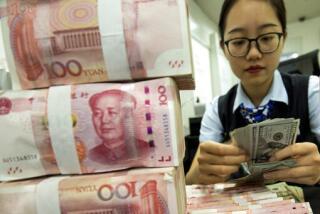China to Ease Limits on Foreign Ventures
PEKING — Chinese authorities announced Tuesday that they plan to make it easier for foreign companies to take profits out of China and, in some instances, to sell more goods in the potentially huge domestic market.
The move is aimed at attracting still-hesitant overseas investors. During the past six years, about 1,800 foreign companies have begun joint ventures with Chinese enterprises, investing $2.8 billion, according to Chinese estimates. The main sources of this money are Hong Kong and the United States.
New Measures Detailed
But many foreign companies have been operating under severe legal handicaps. The most important are restrictions on the ability of foreign companies to convert their earnings in China into foreign currency that can be sent out of the country.
In an interview that appeared Tuesday in the China Daily, a government-controlled publication, a leading government economist detailed new measures involving foreign currency that will be adopted later this week by the State Council, China’s version of a presidential Cabinet. All the changes are aimed at helping foreign companies find ways of converting earnings into foreign currency that can be taken out of China.
“The currency problem is probably the greatest constraint on investment in China,” said Chris Brown, a representative of the National Council for U.S.-China trade in Peking. “There’s no question this is a very important policy decision, long-awaited. It sounds really good, but we have to see how the policy is implemented.”
Often, foreign companies have been unable to convert any of their earnings here. Last fall, when American Motors began production of the Cherokee Jeep in China as a joint venture with a Peking auto maker, company officials acknowledged that there was no agreement at all on a method to convert the renminbi that the company earned in China. They said they planned, instead, to reinvest in the Chinese joint venture and wait until they might be able to take profits out of the country.
Some companies have cut more favorable deals. Atlantic Richfield Chairman Robert O. Anderson told reporters last fall that the contract he signed to produce natural gas off Hainan Island included a provision allowing Arco to convert its earnings to foreign currency. He would not specify exactly how this would be done.
Higher Quotas to Be Weighed
In another move to lure foreign investors, the government is holding out the prospect that it will ease limits on the ability of joint ventures to sell their products in China.
Gu Ming, head of the State Council’s Economic Legislation Research Center, told the China Daily that, if foreign investors bring advanced technology into China and make “sophisticated and internationally competitive products,” then higher quotas of domestic sales for a longer period will be considered.
Foreign companies doing business in China have usually been required to export most of their finished products. Chinese officials have imposed strict limits on access to the domestic market, both because they hope to force the joint ventures to bring in badly needed foreign exchange and because they want to protect the market position of China’s state-owned industries.
Recently, however, some Chinese economists have questioned the wisdom of protectionism.
“If we were bold enough to open our domestic markets to foreign capital, we would not only satisfy the basic requirement of these corporations for an ideal investment environment, we would also provide a strong stimulus to shorten the technological gap between us and the developed countries,” an economist wrote last fall in the magazine Spring of Sciences.
Variety of Transactions
According to Gu, most of the new regulations are designed to open the way for a foreign company in China to engage in a variety of transactions to convert Chinese currency into foreign currencies.
For example, he said, joint ventures in some instances will be allowed to sell their products to Chinese enterprises that have foreign currency reserves. They may also be permitted to reinvest earnings in joint ventures that are earning foreign exchange.
Furthermore, investors will be allowed to set up two or more different joint ventures in China and to use the foreign exchange earnings from one to offset the expenses of another. Until now, each individual joint venture was responsible for providing its own capital.
In the past, a few individual companies have been given permission to engage in these deals. The new rules will make that permission general.
More to Read
Inside the business of entertainment
The Wide Shot brings you news, analysis and insights on everything from streaming wars to production — and what it all means for the future.
You may occasionally receive promotional content from the Los Angeles Times.










